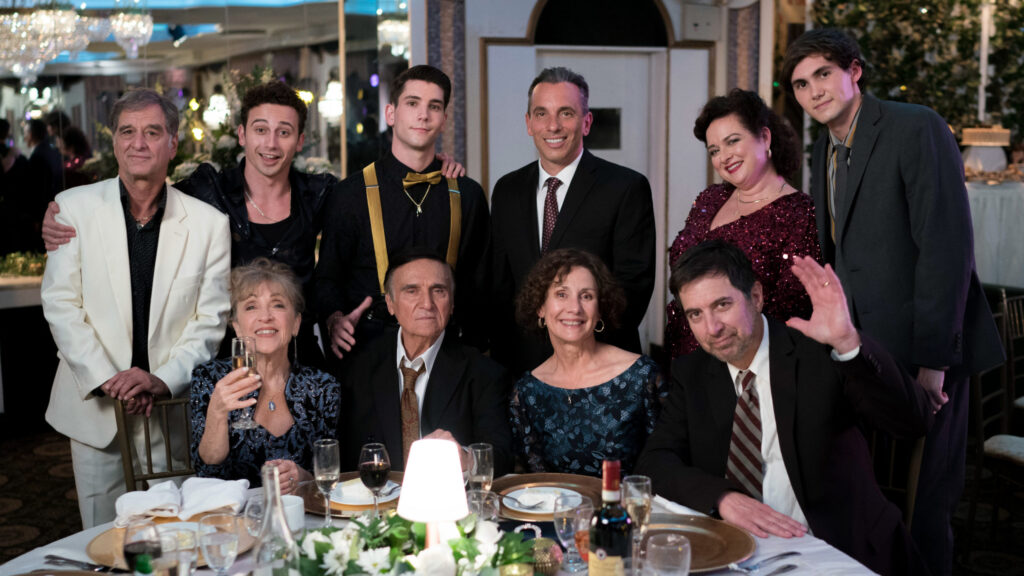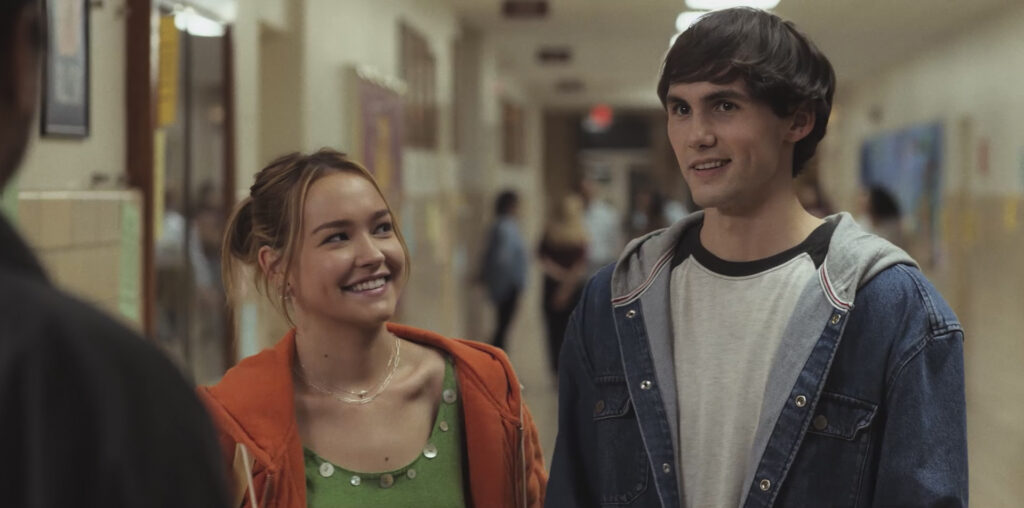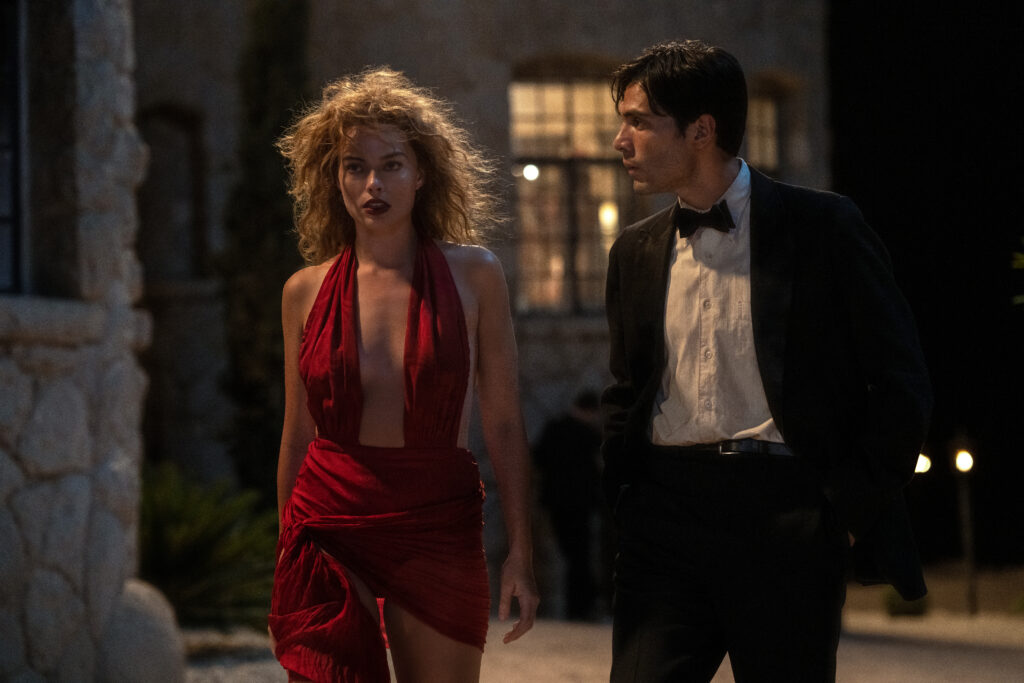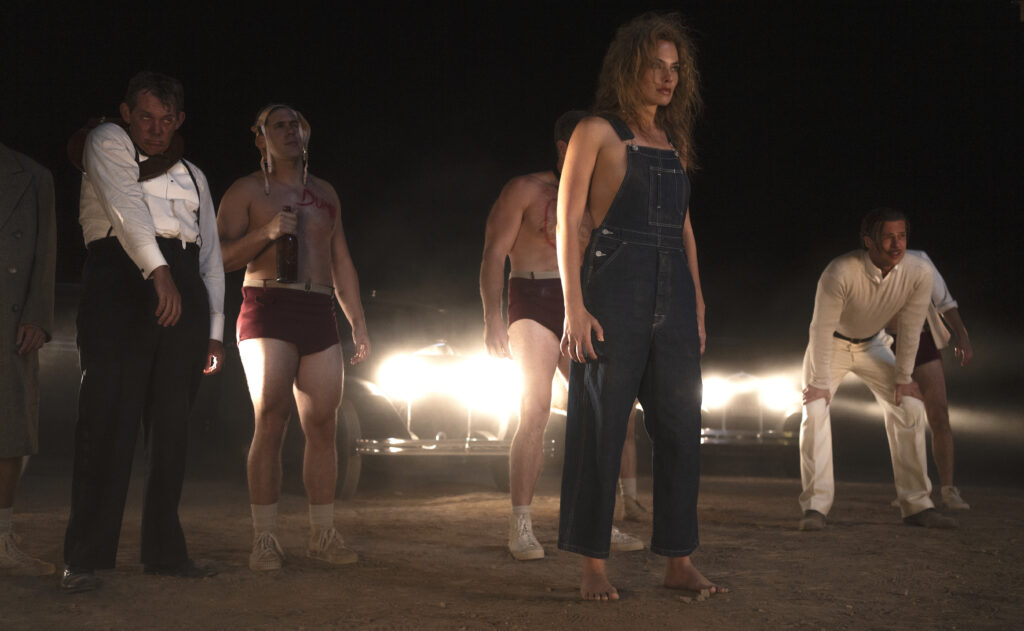April 22, 2023
by Carla Hay

Culture Representation: Taking place in New York City’s Queens borough and in Philadelphia, the comedy/drama film “Somewhere in Queens” features a cast of predominantly white characters (with a few African American, Latinos and Asians) representing the working-class and middle-class.
Culture Clash: A married father deals with several issues in his large Italian American family, including trying to influence his teenage son on what the son will do after graduating from high school.
Culture Audience: “Somewhere in Queens” will appeal primarily to people who are fans of filmmaker/star Ray Romano and dramedies about families experiencing life transitions.

“Somewhere in Queens” has a lot of expected characteristics of movies about large families who frequently bicker but ultimately have a lot of love and loyalty to each other. It’s a movie with realistic characters but very sitcom-like scenarios that are put into the context of a family drama. Laurie Metcalf is a standout in this entertaining movie directorial debut from Ray Romano. “Somewhere in Queens” had its world premiere at the 2022 Tribeca Film Festival.
Romano has a background in stand-up comedy and is widely known for his starring role in the comedy series “Everybody Loves Raymond,” which was on the air from 1996 to 2005. He is one of the stars, producers and writers of “Somewhere in Queens,” which benefits greatly from comedic pacing that is naturalistic and doesn’t look forced or over-rehearsed. Romano co-wrote the “Somewhere in Queens” screenplay with Mark Stegemann, who’s written mostly for TV series (including “Scrubs” and “Preacher”) and who also makes his feature-film debut with “Somewhere in Queens.”
“Somewhere in Queens,” as the title says, takes place in New York City’s Queens borough, which is the borough that is more likely to have family houses with backyards, compared to the high-rise buildings that populate New York City’s Manhattan borough. It’s in Queens where the Russo family lives. This large Italian American clan is working-class and tight-knight, but sometimes has friction that threatens to unravel some of these family bonds.
Here are the members of the family who are featured in the story:
- Leo Russo (played by Romano) works with his two brothers, his two nephews and his father in the family’s Russo Construction business. Leo often feels insecure because he’s never felt like he’s lived up to his father’s expectations.
- Angela Russo (played by Metcalf) is Leo’s sarcastic and outspoken wife. She and Leo were sweethearts in high school and are each other’s first love.
- Matthew “Sticks” Russo (played by Jacob Ward) is the only child of Leo and Angela. Sticks, who got his nickname because he is tall (6’2″) and thin, is quiet and introverted but he has a passion for playing basketball. In this movie, Sticks is in his last year of high school.
- Dominic “Pops” Russo (played by Tony Lo Bianco) is the family’s no-nonsense patriarch who expects all of the men in his immediate family to work with him in the family’s construction business.
- Mama Russo (played by June Gable) is Dominic’s wife, who doesn’t talk much, but she is very observant, and when she does say something, it’s usually important.
- Petey Russo (played by Jon Manfrellotti) is Leo’s laid-back older brother, who is a never-married bachelor with no children.
- Frank Russo (played by Sebastian Maniscalco) is Leo’s competitive and arrogant younger brother, who has had a longtime sibling rivalry with Leo. Frank is Dominic’s favorite child and is the son who is most likely to take over the family business when Dominic retires.
- Luigi Russo (played by Franco Maicas) and Marco Russo (played by Adam Kaplan) are Frank’s two wisecracking sons, who are in their early 20s. (Luigi’s and Marco’s mother is mentioned but not seen in the film.)
- Rosa Russo (played by Dierdre Friel) is Leo’s youngest sibling. Rosa is often teased by Frank for being a never-married bachelorette with no children. She is self-conscious about her weight and being unlucky in love. Her traditional parents see Rosa’s unmarried marital status as a stigma for a woman of a certain age, and they worry that Rosa will never get married and have children.
Several scenes in “Somewhere in Queens” take place at a local banquet hall called Versailles Palace, which is the type of place that is rented out for wedding receptions and family celebrations. It’s where the movie’s opening scene takes place, showing the Russo family attending the wedding reception of a newlywed couple named Louise and Sebastian. The Russos aren’t close to this couple, but apparently were invited to the wedding anyway.
A videographer (played by Lucas Owen) is going around the room to film guests giving short congratulations speeches for the newlyweds. Leo says in his awkward speech, “The best advice I can give to you is don’t hurt each other, if you can avoid it. God bless you, and God bless to all the children you’re going to make for all of America.” The videographer says in an unimpressed tone, “That was different.” Leo then asks the videographer to delete Leo’s recording.
Viewers will see more of Leo’s insecurities and neuroses throughout the movie. At work, he’s treated like an inferior employee by his father. It doesn’t help that Leo has a habit of showing up late for work and isn’t as skilled in construction as Frank is. Leo regrets being stuck in a job with family members who don’t completely respect him. He doesn’t want to quit because he knows how much of a rift it would cause in the family.
At home, Leo and Angela (who is a homemaker) have been having some issues in their marriage. Their sex life is practically non-existent. They don’t really argue a lot, but they’ve become somewhat emotionally distant from each other. And it has something do with Leo and Angela disagreeing about how she’s been handling a medical issue. Leo thinks that Angela should go to support group counseling, but independent-minded Angela thinks that she doesn’t need it. Angela’s medical issue is revealed later in the movie.
Like many middle-aged married couples who’ve raised children together, there comes a time when these couples will have an “empty nest,” with the children no longer living in the home. Angela in particular is dreading not having Sticks in the family home anymore. She thinks she has a few more years after Sticks graduates from high school, because he is expected to work in the family business and eventually get his own place when he can afford to do so. In the meantime, Leo and Angela are supportive parents who go to Sticks’ basketball games to cheer him on as a member of his school team, the Glendale Cougars.
One day, the Glendale Cougars narrowly lose a game (59-61 was the final score) that would have taken the team to the state finals. After the game, a basketball talent scout named Ben Parson (played by P.J. Byrne) notices that Leo is Sticks’ father, from the way that Leo and other Glendale Cougars fans are behaving during the game. Ben approaches Leo after the game and asks Leo what Sticks’ college plans are.
Leo says that Sticks has no plans to go to college because Sticks will be working in the family’s construction business. Ben is surprised and says that someone with Sticks’ basketball talent could easily get a basketball scholarship—maybe not at a top-tier basketball school, but at a mid-tier basketball school. Ben says he knows a recruiter at Drexel University in Philadelphia and can recommend Sticks to Drexel. Leo says he’ll think about it.
Leo does more than think about it. When he brings up the idea to the family, he gets a lot of resistance from almost everyone else in the family. Dominic and Frank think it’s not worth paying for a college degree that Sticks won’t need in their line of work. Angela is worried about Sticks moving away from New York, even though Philadelphia is only a two-hour drive away. Leo convinces Angela and Sticks to at least visit the Drexel campus with him to see what Drexel has to offer.
Meanwhile, around the same time that these college plans start to take shape for Sticks, he has fallen in love with an extroverted, intelligent and vivacious classmate named Dani Brooks (played by Sadie Stanley), who comes from an upper-middle-class family in the Queens neighborhood of Forest Hills. Dani is Sticks’ first girlfriend, and she’s a lot more experienced in dating than he is. Sticks doesn’t introduce Dani to his parents until after his school’s last basketball game of the season.
Angela is immediately annoyed that Sticks kept this relationship a secret for as long as he did. She also doesn’t trust Dani because she thinks Dani is the “heartbreaker” type. Still, Angela puts up a front of being welcoming and invites Dani over to a family dinner, where Dani gets a full view of what the Russo clan is like. It’s at this dinner that the family finds out that Dani is assertive, adventurous, and not afraid to disagree with people about her own firm beliefs. Dani is very opinionated in telling the family why she thinks it’s a good idea for Sticks to go to college.
Dani says her own plans after high school are to take a cross-country road trip by herself. She mentions that her parents want her to go to a university, preferably an Ivy League university, but Dani doesn’t think that getting a university education is the right decision for her at this time in her life. And she says that her father told her that he will only financially support her if she goes along with her parents’ wishes to got to a university. Dani, who has a part-time waitress job at a local diner, says she took the job to save up for money to buy the car that she wants to take on her road trip.
“Somewhere in Queens” then becomes about how Leo gets obsessed with what Sticks wants to do with his life after graduating from high school. Leo doesn’t want Sticks to have the same life and the same regrets that Leo has. Leo wants Sticks to explore the options that Leo never did. Leo is also excited about the possibility of his son being a college graduate. It’s not said out loud, but it’s obvious that Sticks would be the first person in his family to get a college degree, if he chooses to make that decision.
There are a few unexpected turns in the story that involve Leo crossing a boundary and doing some meddling-parent things that are downright creepy. It leads to some sitcom-ish scenarios that don’t look very realistic. “Somewhere in Queens” also has a subplot about Leo being attracted to a Russo Construction customer named Pamela Carmelo (played by Jennifer Esposito), a lonely widow who seems attracted to Leo too. The outcome of this flirtation is fairly predictable.
Romano’s direction of “Somewhere in Queens” moves the story along at a leisurely but engaging pace. As an actor in the movie, he’s doing a version of the neurotic father he played in “Everybody Loves Raymond,” so there are no real surprises in his performance. Metcalf has the best role in the movie, and she rises to the occasion by going through a myriad of emotions that are authentically portrayed and make Angela a completely believable character.
Angela is an overprotective mother who’s trying to appear strong but is really desperately holding on to the one thing (parenthood) that she feels she’s been good at in her life. She’s also feeling a sense of mortality because of her medical issue. It’s a different type of mid-life crisis than what Leo is experiencing. And it’s affected Leo and Angela’s marriage a lot more than they care to admit.
“Somewhere in Queens” also has very good performances from Ward and Stanley, because Sticks and Dani’s relationship is the catalyst for many things that happen in the movie. This teen romance is also very realistic in all of its ups and downs, especially when it comes to the issue of what will happen to the relationship after they graduate from high school. The character of Sticks is interesting because he’s a star of his school’s basketball team, but he isn’t the typical movie stereotype of a popular jock. Sticks is almost painfully shy, but Dani helps him come out of his shell and express his true feelings.
Above all, “Somewhere in Queens” succeeds in showing how people in the same family can discover in different ways what their own comfort levels or discomfort levels are, when it comes to self-esteem and family relationships. A trite movie would have made it look like the teenagers are the only ones who have a lot to learn. “Somewhere in Queens” shows in charming and poignant ways how there’s no age expiration date on learning self-acceptance and learning to accept people for who they really are.
Lionsgate and Roadside Attractions released “Somewhere in Queens” in U.S. cinemas on April 21, 2023.


